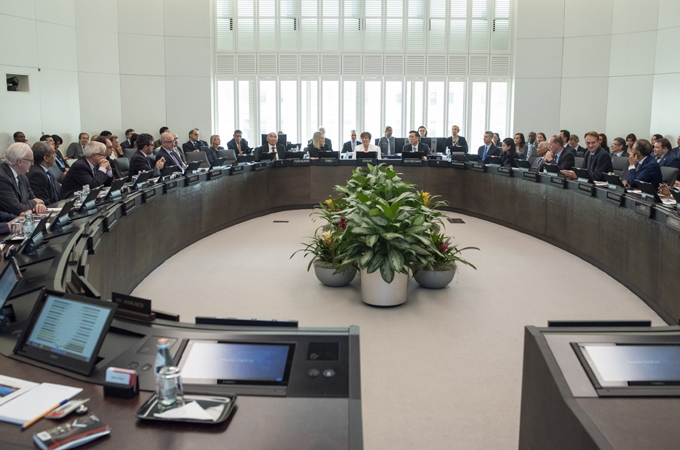
The IMF Executive Board at a meeting
IMF predicts 2.9% growth for Bahrain this year
WASHINGTON, July 13, 2023
Bahrain's growth is projected to moderate to 2.7 percent in 2023, with non-oil GDP growing by 3.3 percent reflecting fiscal consolidation and higher interest rates, an IMF report said.
Thereafter, growth is projected to stabilise at around 2.7 percent over the medium term, it said. The report follows the conclusion of IMF Executive Board's Article IV consultation with Bahrain.
Bahrain experienced strong growth in 2022, in line with other Gulf Cooperation Council countries. Continued fiscal reform momentum and high oil prices improved fiscal and external balances. The economy grew by 4.9 percent in 2022, driven by 6.2 percent growth in non-hydrocarbon GDP while hydrocarbon GDP contracted by 1.4 percent. Non-hydrocarbon growth was driven by public, financial, and hospitality services and manufacturing. CPI inflation accelerated from -0.6 percent, on average, in 2021 to 3.6 percent in 2022.
With the economic recovery well under way, ongoing fiscal reforms, and higher oil prices, the state budget deficit declined significantly, narrowing to 1.2 percent of GDP in 2022, from 6.4 percent in 2021, while the overall fiscal deficit declined from 11 to 6.1 percent of GDP.
Government debt declined to 117.6 percent of GDP in 2022 from 127.1 percent of GDP in 2021. The current account improved markedly and posted its largest surplus in decades, estimated at 15.4 percent of GDP in 2022, up from 6.6 percent of GDP surplus in 2021. The banking system remains resilient with ample buffers and has so far withstood the phasing out of Covid measures and tightening financial conditions, it noted.
"Nevertheless, significant uncertainty clouds the forecast, including from oil price volatility, international financial turmoil and ongoing tightening, and a slowdown in global growth," the report said.
Committed to reforms
The authorities remain strongly committed to their fiscal and structural reform agenda as outlined in the Fiscal Balance Program and Economic Recovery Plan with a focus on reducing the fiscal deficit and public debt, while advancing diversification efforts, including by increasing labour market flexibility, further lifting female labor force participation, enhancing economic digital infrastructure, and addressing climate change challenges, it noted.
IMF Executive Directors commended Bahrain’s strong post-Covid growth and fiscal performance, supported by successful Covid responses, continued reform momentum, and favourable commodity prices. Noting that growth is projected to moderate and risks remain, directors emphasised the importance of implementing a medium-term fiscal adjustment plan, safeguarding financial stability, and accelerating structural reforms.
They welcomed the authorities’ continued commitment to implementing reforms under the Fiscal Balance Program (FBP), including the progress so far to enhance non-hydrocarbon revenue mobilisation and the continued spending restraint. They underscored that implementing the current budget in line with FBP targets and continuing with ambitious reforms in the medium term are critical to ensure fiscal and external sustainability and reduce reliance on oil revenues. Directors also highlighted the importance of embedding fiscal reforms in a credible medium-term fiscal framework. Improving debt and fiscal transparency including by gradually reducing extrabudgetary spending would be important, the report said.
Peg serves well
Directors agreed that the exchange rate peg continues to serve Bahrain well as a monetary anchor. In this context, they stressed that fiscal consolidation and structural reforms will support the external position, while monetary policy should continue to follow the Fed.
Directors welcomed Bahrain’s ambitious structural reform agenda. They encouraged the authorities to continue improving labour market flexibility and empowering women, and leveraging opportunities from regional integration. Pressing ahead with climate mitigation, through a gradual phasing out of energy subsidies and further investments in renewable energy, would facilitate Bahrain’s climate transition without creating additional fiscal needs or weighing on growth, the report added. - TradeArabia News Service








